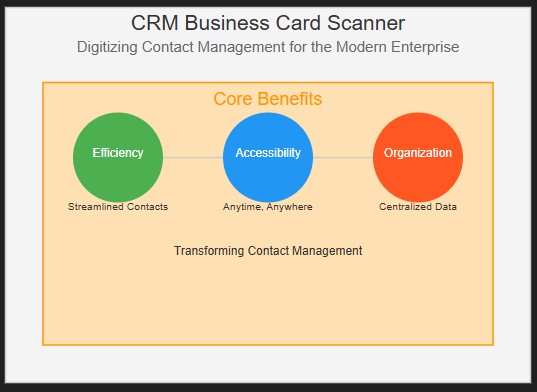Despite the digital wave transforming how we connect, business cards remain a staple of professional networking. Whether at conferences, meetups, or client meetings, cards are exchanged by the millions. But here’s the catch—most of them end up lost, forgotten, or buried in a drawer.
Table of Contents
Why Business Card Scanners Matter in the CRM Era
That’s where the CRM Business Card Scanner comes in—a powerful, AI-enhanced tool that allows professionals and sales teams to instantly convert physical business cards into digital CRM records. With the rise of remote work, globalization, and fast-paced sales environments, these tools play a critical role in streamlining contact acquisition, minimizing data entry, and supercharging sales pipelines.
This article dives into what CRM business card scanners are, how they work, which platforms offer the best functionality, and why they’ve become indispensable in modern CRM ecosystems.
1. What Is a CRM Business Card Scanner?
A CRM Business Card Scanner is a digital tool—typically part of a CRM mobile app—that uses OCR (Optical Character Recognition) and AI to extract information from physical business cards. It then automatically populates that data into the CRM system as a contact, lead, or opportunity.
✅ Key Info Captured:
-
Name
-
Job Title
-
Company
-
Phone Number(s)
-
Email Address
-
Website
-
LinkedIn profile
-
Notes and tags
These scanners reduce human error, save time, and provide instant access to contacts across teams and devices.
2. How Does a Business Card Scanner Work?
The process is frictionless and efficient:
-
Snap a Photo: Open the CRM app, and take a photo of the business card.
-
OCR Technology: Optical Character Recognition converts the printed text into digital format.
-
AI Parsing: The system identifies relevant fields (name, phone, etc.) and assigns them.
-
CRM Sync: A new contact or lead is created in your CRM system—often with enrichment from the web or social media.
-
Automation Triggered: Some CRMs initiate workflows like welcome emails, lead scoring, or pipeline assignment.
3. Why Business Card Scanning Matters in CRM Strategy
Manual entry kills productivity. Scanning business cards into a CRM platform provides three powerful benefits:
1. 📲 Speed and Efficiency
Inputting contact details takes seconds—not minutes.
2. 🎯 Sales Enablement
Instant CRM entry allows reps to follow up within minutes—boosting conversion.
3. 💾 Data Accuracy
AI reduces typos and misread information compared to human entry.
4. Best CRM Platforms with Built-In Business Card Scanners
🔹 HubSpot CRM
-
Built-in mobile scanner in iOS & Android apps
-
AI-driven accuracy
-
Free to use with HubSpot’s free CRM
🔹 Zoho CRM
-
Features a full business card scanner app
-
Direct CRM sync
-
Supports multiple languages
🔹 Salesforce (via Salesforce Mobile)
-
Built-in Einstein Vision OCR
-
Supports lead routing and territory management
-
Integration with third-party scanning apps like ScanBizCards
🔹 Pipedrive
-
Available via third-party apps like Magnetiq or SnapADDY
-
Simple, intuitive UI
🔹 Microsoft Dynamics 365
-
Integrates with Office Lens and Power Apps
-
Scanned cards trigger Power Automate flows
5. Standalone Business Card Scanning Apps That Integrate with CRMs
Even if your CRM doesn’t offer built-in scanning, many apps offer seamless integrations:
| App | Features | CRM Integrations |
|---|---|---|
| ScanBizCards | Batch scanning, export to CSV | Salesforce, HubSpot, Zoho |
| CamCard | Group management, multilingual OCR | Salesforce, Outlook |
| ABBYY Business Card Reader | AI-powered OCR, card grouping | Salesforce, Dynamics |
| Covve Scan | Offline scanning, export | Google Contacts, CRMs via Zapier |
6. Real-World Use Case: CRM Card Scanner in Action
Scenario: Sales team attends a 3-day tech expo and collects 500+ business cards.
Without Scanner:
-
2 days spent manually entering data
-
Inaccurate entries, missed leads
-
Delayed follow-ups = lower conversions
With CRM Card Scanner:
-
All cards scanned within 1 hour
-
CRM contacts tagged, segmented, and followed up
-
Result: 25% increase in post-event conversions
7. Key Features to Look for in a CRM Card Scanner
When evaluating a business card scanner, prioritize these must-have features:
| Feature | Why It Matters |
|---|---|
| OCR Accuracy | Clean data reduces post-editing |
| Multi-Language Support | Essential for global business |
| CRM Auto-Sync | Saves manual effort |
| Batch Scanning | Useful for trade shows and large events |
| Cloud Backup | Ensures no data loss |
| Smart Tagging | Improves organization and segmentation |
| Duplicate Detection | Prevents CRM clutter |
8. Benefits for Sales, Marketing, and Operations Teams
🧑💼 Sales Teams
-
Instantly add new leads to pipeline
-
Never lose a connection after a networking event
📣 Marketing Teams
-
Enrich contact data for targeted campaigns
-
Segment scanned contacts by industry or title
🏢 Operations
-
Ensure uniform data entry and CRM hygiene
-
Analyze card origin for event ROI tracking
9. Privacy, Compliance & Security
When scanning business cards into cloud-based CRMs, data privacy must be a top concern.
🔐 Best Practices:
-
Use tools with GDPR, CCPA compliance
-
Enable user consent forms for email marketing
-
Ensure end-to-end data encryption
-
Set role-based access controls for CRM contact data
10. The Future of CRM Business Card Scanning
The evolution of AI, AR, and voice recognition is taking scanning to the next level:
🔮 AI-Driven Enrichment
Post-scan, AI fetches LinkedIn profiles, recent articles, or company details.
🔮 Augmented Reality Scanning
AR overlays LinkedIn stats or CRM data over a card in real-time.
🔮 Voice-Activated Scanning
“Hey CRM, scan and save this card to my leads pipeline.”
🔮 No-Card Networking
QR-based virtual cards that auto-sync into CRMs during live events.
11. Challenges and Limitations
No tool is perfect. Here are some potential issues to anticipate:
-
Blurry or poorly printed cards may cause OCR errors
-
Fonts or designs can confuse AI
-
Duplicate contact creation if CRM deduplication isn’t strong
-
Privacy issues if cards are scanned without permission
✅ Solution: Always review scanned data before saving and configure deduplication rules.
12. Tips for Using CRM Business Card Scanners Efficiently
-
Scan immediately: Don’t wait days or weeks—real-time follow-ups work best
-
Add tags: Include event name, industry, or deal stage
-
Use batch mode: Perfect after trade shows or seminars
-
Automate follow-ups: Trigger drip campaigns or meeting requests
-
Sync across teams: Share scanned data with marketing or support
Conclusion: Scan, Sync, and Scale Your Business
In 2025 and beyond, CRM Business Card Scanners are no longer optional—they’re a core component of modern contact management strategies. They combine convenience, AI, and integration to supercharge your CRM workflows.
From small business owners to enterprise sales reps, anyone dealing with face-to-face networking or event-based lead generation can benefit immensely from this technology.
In a world of speed and data, the edge goes to those who digitize faster. Don’t let valuable contacts stay analog. Scan them. Sync them. Win them.




